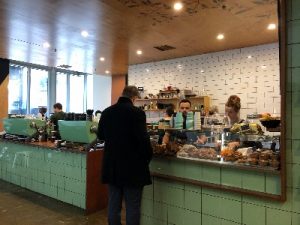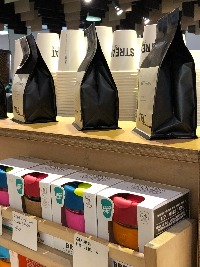On any given day, the streets of Melbourne’s CBD are filled with people lining up outside their usual haunts waiting for their morning fix before starting the day.
It probably doesn’t come as a surprise to its residents that Melbourne has been voted the second best city in the world for its coffee, according to CNN travel, 2017.
Contributing to Melbourne’s caffeine addiction, several cafés are well known for producing high quality coffee and exceptional service.
In recent times, however, cafés have become a little more than that, as more and more businesses take on a role of social responsibility in society.
Some have focused on becoming more environmentally sustainable, a concept popularised by the airing of ABC’s renowned ‘War on Waste’.
The program highlighted that disposable cups can’t be recycled due to its plastic inner-lining contaminating other recyclable material. To make matters worse, it cited an estimate of one billion disposable coffee cups going into landfill annually.
One way that Melbourne café The League of Honest Coffee has improved its footprint is by becoming an advocate for KeepCups.
Staff member Paige Clark believes about a quarter of their 800 daily patrons consistently use KeepCups.
 KeepCup, who offer disposable alternatives, have made ground-breaking sales after War on Waste program aired. To date, their website boasts an estimate of a whopping 3.5 billion disposable cups being diverted from landfill by KeepCup users alone.
KeepCup, who offer disposable alternatives, have made ground-breaking sales after War on Waste program aired. To date, their website boasts an estimate of a whopping 3.5 billion disposable cups being diverted from landfill by KeepCup users alone.
Clarke emphasises the need for more cafes and consumers to expand their awareness of the sustainability mission, and that people are set in their ways and seem to find using reusable cups inconvenient.
“A lot of people don’t want to use KeepCups so I guess it’s a matter of an education role [that we need to play] as a company that provides a sustainable product,” she told upstart.
“They want the paper cup, they want the straw. I’ve seen people play around with straws and that breaks my heart. ”
Clark says the staff have become environmentally conscious through this process.
“None of us use straws; most of us don’t use take-away cups. I haven’t used a paper cup since June of last year,” she said.
“I’m not even promoting KeepCups necessarily; just grab a mug from your office.
“Our ethos is consumer education and how we can reduce [waste]. There are a lot of things we can improve from; there is still room for us to grow.”
Another movement that is fast expanding in the hospitality industry is social enterprise.
The STREAT cafe is one of many hospitality social enterprises which focus on providing vocational training for disadvantaged youth aged 16-24. It provides individualised assistance from start to finish with the hope of setting them up for life with the security of employment and accommodation.
 Elise Bennetts, Chief Relationships Officer at STREAT, has had 20 years of experience working for not-for-profit organisations and only recently moved across to STREAT.
Elise Bennetts, Chief Relationships Officer at STREAT, has had 20 years of experience working for not-for-profit organisations and only recently moved across to STREAT.
“Social enterprise is completely different from not-for-profit in the sort that it’s more about a business and creating the maximum amount of business to get profit to then do good whereas not-for-profit is very much about fund raising,” she told upstart.
Bennett’s greatest challenge is dealing with young people’s past.
Some individuals come into the program straight out of prison, with mental illnesses or from dealing with drugs and alcohol. At times, a lot of them have all three.
“I call it a challenge but also our greatest strength to be able to support those kids as well,” Bennett said.
“We actually hand-hold a lot of kids…making sure that after that they then are able to come and do work experience with us.”
The program spans over six months and are offered to disadvantaged young people.
“A lot of these kids are in crisis when they meet us,” Bennett said.
“We work very quickly to get them out of crisis and then the next few months are really about creating confidence and belonging here at STREAT to make sure that they feel comfortable enough to move to the next level.”
So, how can people help organisations like STREAT?
“Doing business with us,” Bennett said.
“The more coffees we sell the more business that we do the more we’re able to help young people.
“Our hope for the next couple of years is to get up to 1095 [young people] which is one young person per meal that we have over a year.”
According to Bennetts, there have been over 75 hospitality social enterprises identified in Victoria alone.
“Social enterprise is definitely the way forward to be able to do maximum good,” she said.
“The culture here is extraordinary because you get to see things happening every day that’s pretty special.”
Shazma Gaffoor is a first-year Media and Communications student at La Trobe University. You can follow her on Twitter @ShazGaffoor
Cover photo from pexel.com and additional photos by author.







